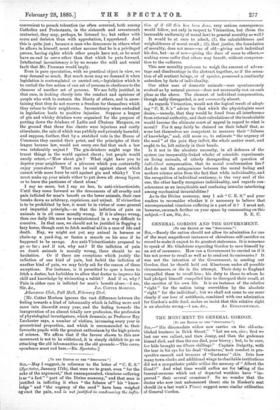LTO THE EDITOR OF THE " SPECTATOR '1
SIR,—May I suggest,.in reference to the letter of "C. E. S." .(Spegator, January 17th), that were we to grant, even "for the sake of the argument," that uncompensated, vicarious suffering is as "a fact" "part of the Divine economy," and that man is justified in inflicting it when "the fulness of" his " knowledge " and "the urgency of the need" have been weighed ag Linst the pain, and is not justified in condemning the inflic tion of it till this has been done, very serious consequences would follow, not only in respect to Vivisection, but (from the inexorable uniformity of moral law) to general morality as well?
It would be at once to admit, (1), the calculableness and weighableness of moral result ; (2), that justice, the foundation of morality, does not mean—as of old—giving each individual his due, but—as of new—giving the dues of some to others,— making some suffer that others may benefit, without compensation to the sufferers.
This new morality professes to weigh the amount of advantage and disadvantage in the abstract together, as if the sensation of all sentient beings, or of species, possessed a continuity unbroken by facts of individuality.
Our other uses of domestic animals—uses spontaneously evolved as by natural process—does not necessarily rest on such pleas as the above. The element of individual compensation, though sadly disregarded, is not necessarily absent. As regards Vivisection, would not the logical result of adopting "C. E. S.'s" advice be that which the physiologists most desire,—namely, that they would be freed from all interference from external authority, and their calculations of the incalculable would become the ultimate court of appeal in regard to what is moral? For it may fairly be claimed on their behalf that, as none but themselves are competent to measure their "fulness of knowledge," and, still more so, to estimate "the urgency of the need ". of the pain they inflict, the whole matter Must, and ought to be, left entirely in their hands.
Is it not in the absolute necessity, in all defences of the system (an inseparably-linked whole) of scientific experiments on living animals, of utterly disregarding all question of individual compensation, that its moral condemnation lies 13 And do not the antagonisms between the moral feeling and modern science arise from the fact that while individuality, and the recognition of individual sentiency, is the very soul of the one, the other hardly recognises individuality, and regards consciousness as an inexplicable and confusing intruder interfering among mechanical invariabilities ?
As to the Divine economy, may I ask "C. E. S." and your readers to reconsider whether it is necessary to believe that uncompensated vicarious suffering is a part of it ? I must not. however, encroach further on your space by commenting on this subject.—I am, Sir, &c., S. E. C.


































 Previous page
Previous page